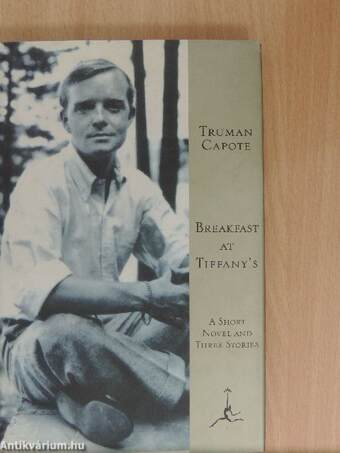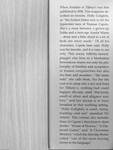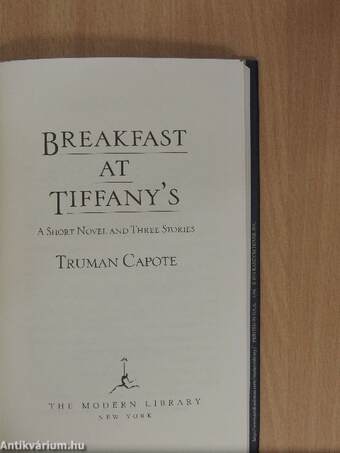1.067.691
kiadvánnyal nyújtjuk Magyarország legnagyobb antikvár könyv-kínálatát

VISSZA
A TETEJÉRE
JAVASLATOKÉszre-
vételek
Breakfast at Tiffany's
A Short Novel and Three Stories
| Kiadó: | The Modern Library |
|---|---|
| Kiadás helye: | New York |
| Kiadás éve: | |
| Kötés típusa: | Vászon |
| Oldalszám: | 161 oldal |
| Sorozatcím: | |
| Kötetszám: | |
| Nyelv: | Angol |
| Méret: | 19 cm x 12 cm |
| ISBN: | 0-679-60085-x |
naponta értesítjük a beérkező friss
kiadványokról
naponta értesítjük a beérkező friss
kiadványokról
Fülszöveg
When Breakfast at Tiffany's was first
published in 1958, Time magazine de-
scribed its heroine, Holly Golightly,
as "the hottest kitten ever to hit the
typewriter keys of Truman Capote.
She's a cross between a grown-up
Lolita and a teen-age Auntie Mame
alone and a little afraid in a lot of
beds she never made." Of all his
characters, Capote later said, Holly
was his favorite, and it is easy to see
why. This wacky hillbilly-turned-
playgirl who lives in a Manhattan
brownstone shares not only his phi-
losophy of freedom and acceptance
of human irregularities but also
his fears and anxieties—"the mean
reds" she calls them. For her the
cure is to jump into a taxi and head
for Tiffany's; nothing bad could
happen, she says, amid "that lovely
smell of silver and alligator wal-
lets/' and her dream is to have
breakfast in that soothing setting.
"Holly Golightly is outre, funny,
touching—and real," remarked The
Atlantic. This volume also includes
three of... Tovább
Fülszöveg
When Breakfast at Tiffany's was first
published in 1958, Time magazine de-
scribed its heroine, Holly Golightly,
as "the hottest kitten ever to hit the
typewriter keys of Truman Capote.
She's a cross between a grown-up
Lolita and a teen-age Auntie Mame
alone and a little afraid in a lot of
beds she never made." Of all his
characters, Capote later said, Holly
was his favorite, and it is easy to see
why. This wacky hillbilly-turned-
playgirl who lives in a Manhattan
brownstone shares not only his phi-
losophy of freedom and acceptance
of human irregularities but also
his fears and anxieties—"the mean
reds" she calls them. For her the
cure is to jump into a taxi and head
for Tiffany's; nothing bad could
happen, she says, amid "that lovely
smell of silver and alligator wal-
lets/' and her dream is to have
breakfast in that soothing setting.
"Holly Golightly is outre, funny,
touching—and real," remarked The
Atlantic. This volume also includes
three of Capote's best-known short
stories: "House of Flowers," "A Dia-
mond Guitar," and "A Christmas
Memory," which the Saturday Review
called "one of the most moving
stories in the language." Vissza
Témakörök
- Idegennyelv > Idegennyelvű könyvek > Angol > Szépirodalom > Regény, novella, elbeszélés
- Szépirodalom > Regény, novella, elbeszélés > Az író származása szerint > Amerika > Amerikai Egyesült Államok
- Szépirodalom > Regény, novella, elbeszélés > Tartalom szerint > Romantikus regények
- Szépirodalom > Regény, novella, elbeszélés > Tartalom szerint > Filmregények
- Szépirodalom > Regény, novella, elbeszélés > Tartalom szerint > Összegyűjtött elbeszélések
Truman Capote
Truman Capote műveinek az Antikvarium.hu-n kapható vagy előjegyezhető listáját itt tekintheti meg: Truman Capote könyvek, művekMegvásárolható példányok
Nincs megvásárolható példány
A könyv összes megrendelhető példánya elfogyott. Ha kívánja, előjegyezheti a könyvet, és amint a könyv egy újabb példánya elérhető lesz, értesítjük.






